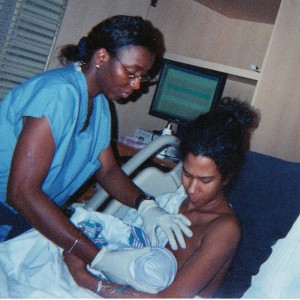7/26/2014


The North Carolina Child Fatality Task Force is pushing for an initiative to have Medicaid cover medical lactation support services.
By Jasmin Singh
Nothing seems more natural than for a mother to breastfeed her baby. But Anne-Marie Meyer found it’s not always the case.
“It’s probably one of the hardest things I’ve had to do in my entire life,” said Meyer, who lives in Carrboro.
When both of Meyer’s daughters were born, they each had health problems and had a hard time eating. But Meyer persisted, with the help of her lactation consultant, Ellen Chetwynd.
Lactation consultants provide support and education for women who struggle with breastfeeding. Meyer said that without Chetwynd’s help, “I would have failed.”
Now the legislative Child Fatality Task Force would like to see women covered by Medicaid get the same help Meyer got with breastfeeding. Its members are pushing for a special provision in the budget to allow the Division of Medical Assistance, which manages the state’s Medicaid program, to implement coverage for medical lactation support for women on Medicaid.
Elizabeth Hudgins, executive director of the task force, said the goal of the initiative is to save infant lives.
“Our main concern is that this proposal is estimated to save 14 to 18 infant lives this year,” she said.
What is a lactation consultant?
Chetwynd explained that lactation consultants are “the physical therapists of the breast.” Catherine Sullivan, agrees. She is a clinical instructor and director of training at the Carolina Global Breastfeeding Institute.

Ellen Chetwynd, left, and Catherine Sullivan, right, co-chair a committee under the NC Breastfeeding Coalition. Chetwynd said lactation consultants are care providers whose specialty is breastfeeding moms and babies. Photo credit: Jasmin Singh
“They know how the breast works, how it functions, how babies are supposed to be feeding,” she said.
Sullivan said lactation consultants provide more than just basic support.
“They do assessment, they do counseling and education, they work with the primary care provider if it’s a medical issue that’s outside of their scope,” she said. “They are part of that health care team for the mom.”
Meyer said if her health insurance did not cover her lactation consultants, she would not have been able to breastfeed her children.
Benefits of breastfeeding
Chetwynd, a lactation consultant, said the benefits of breastfeeding are huge.
“The nice thing about breastfeeding is that there are benefits for both mom and baby,” she said.
Chetwynd said breast milk helps strengthen the baby’s immunity by providing immune factors: “When a mother breastfeeds her baby, she’s not just giving the baby nutrition, she’s helping the baby’s immune system to understand what’s going on.”
Meyer said she saw the benefits when breastfeeding her children.
“When I was breastfeeding her, as hard as it was for me, she was doing better and I was doing better,” she said. “She never needed antibiotics; she’s bigger and very healthy.”

A nurse helps a newly delivered mom latch on. Breastfeeding is best initiated while a woman is still in the hospital with her baby. Image courtesy Eden Pictures, flickr creative commons
Research shows that immediate benefits include fewer ear infections, hospitalizations and upper-respiratory infections. Breastfeeding also provides long-term benefits, like decreased risk of asthma, diabetes, blood pressure and childhood obesity.
Long-term benefits for mothers include reduced risk of ovarian and breast cancer, diabetes, hypertension and heart disease.
According to a Child Fatality Task Force fact sheet, the estimated savings to Medicaid by covering lactation support services would be in excess of $2 million annually.
A three-pronged approach
Meyer said there are three main forms of support a woman needs to successfully breastfeed.
“There’s structural support and policy; there’s the mechanism and actually learning how to do it; and then there’s emotional support of the people around you, like the husband, the partner, friends, society,” she said.
Meyer said there’s nothing like the support she got from her lactation consultants.
“Pediatricians don’t know how to do this, OB-GYNs don’t know how to do this,” she said. “It’s a very specialized body of knowledge that is held by lactation consultants, and it’s critical for some women to have that or else they would have failed.”
Saving money and saving lives
The breastfeeding initiative is “special” said Tom Vitaglione, a analyst for NC Child, an advocacy group.
“It’s rare that something like this would happen, where you save lives and save money,” he said.
But despite the obvious benefits, Vitaglione said, the process of approval has taken longer than the task force thought.
“For people who are not used to this and haven’t been looking at it for a long time, it takes awhile to really generate some good, positive thoughts about it,” he said.
Meyer said she’s glad she was able to breastfeed her children and hopes other women get the support they need to start.
“It’s probably been one of the most rewarding things,” she said.
An earlier version of this story implied Chetwynd and Sullivan are committee co-chairs of the International Board Certified Lactation Consultants Advocacy Committee.


.jpg?w=440&h=330&aspect=nostretch)
.jpg?w=440&h=330&aspect=nostretch)